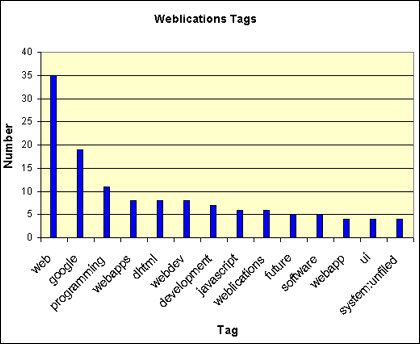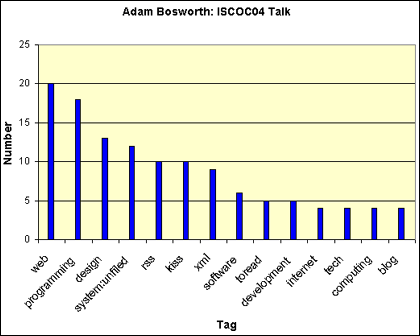I’m trying to figure out what ‘Web 2.0’ means to people. These are the reasons why I’m
trying to figure this out:
* I want to define it so that my tagline makes sense to people 🙂
* Web 2.0 is my niche topic. It’s my little piece of The Long Tail and I want to
attract more readers and subscribers to it. Ideally I’d like my blog to appeal not just
to webheads, but other people whose careers and lives are being transformed by the Web
(e.g. journalists, educators, investment analysts).
* I’d also like to attract some sponsors, or patrons. So I want to know how
they view Web 2.0.
* I want to subscribe to more topic/tag/remix feeds about Web 2.0, so therefore I need
to find out the synonyms, related words and key phrases.
del.icio.us tags for Web 2.0 content
To investigate what words and phrases people associate with Web 2.0, I took a close
look at two popular Web 2.0-ish articles and noted what tags people stored them under in
del.icio.us. The first post was Adam Rifkin’s
fantastic Weblications. It currently has 99 people linking to it on del.icio.us and
here is an excel chart showing the top tags:

The most popular are “web”, “google” and “programming”.
The next article I looked at was Adam Bosworth’s influential ISCOC04 Talk, which currently
has 122 outbound del.icio.us links. Here is a chart for that:

Again, “web” and “programming” are the most-used tags.
I should note that Rifkin didn’t use the phrase “Web 2.0” in his post (he’s coined his
own: The Web Way) and Bosworth only mentioned it once. Nevertheless, both posts discussed
at great length the benefits of using the Web as a platform – and so I would’ve thought
people would link the content in their minds to “Web 2.0”. It seems not – only 3
del.icio.us users tagged Bosworth’s with “web 2.0” and I think I was the only person to
do so with Rifkin’s post. Hmmm, looks like I need to define “Web 2.0” then 😉
Defining Web 2.0
I’ve been busily storing links about Web 2.0 in del.icio.us over the past month. Here are
10 excellent definitions that I’ve come across:
John Battelle (talking about upcoming conferences): “eTech is
where the seeds of new and interesting technologies are first discovered, whilst Web 2.0
is where they take root in the soil of business.”
Kingsley
Idehen: “…a Point of Presence on the Web for exposing of invoking Web Services
and/or Syndicating or Subscribing to XML based content.”
Wirearchy:
“According to the experts, Web 2.0 is on its way to the workplace soon – it’s an
infrastructure that’s decentralized and more open than that which exists today.”
Jon Udell (as quoted in a classic essay by Tim O’Reilly): “Don’t
think of the Web as a client-server system that simply delivers web pages to web servers.
Think of it as a distributed services architecture, with the URL as a first generation
“API” for calling those services.”
The World 2 Come (talking
about the Web 2.0 Conference in October 04): “The
conference will debut with the theme of ‘The Web as Platform,’ exploring how the Web has
developed into a robust platform for innovation across many media and devices – from
mobile to television, telephone to search.”
Deep
Green Crystals: “The next generation of web applications will leverage the shared
infrastructure of the web 1.0 companies like EBay, Paypal, Google, Amazon, and Yahoo, not
just the “bare bones transit” infrastructure that was there when we started…”
Jeff Bezos: “web
2.0…is about making the Internet useful for computers.”
computeruser.com:
“Yesterday’s challenge of producing elegant and database-driven Web sites is being
replaced by the need to create Web 2.0 ‘points of presence'”
Adam
Rifkin: “They don’t see that the power of Weblications is that “simplicity and
flexibility beat optimization and power in a world where connectivity is key”, as Adam
Bosworth put it.”
Mitch Kapor: “The web
browser and the infrastructure of the World Wide Web is on the cusp of bettering its
aging cousin, the desktop-based graphical user interface for common PC applications.”
My Definition
So what’s my definition of Web 2.0? Well I prefer the succinct “The Web as Platform”,
because I can then fill in the blanks depending on who I’m talking to. For corporate
people, the Web is a platform for business. For marketers, the Web is a platform for
communications. For journalists, the Web is a platform for new media. For geeks, the Web
is a platform for software development. And so on.
Keywords from those 10 quotes
Point of Presence; Web Services; Syndication; decentralization; open; distributed
services architecture; API; The Web as Platform; innovation; media and devices;
infrastructure; utility/usefulness; simplicity and flexibility; connectivity; web
browser.
Keywords don’t match del.icio.us tags
It’s interesting that very few of the keywords I’ve picked out above were used as tags
in delicious for the Rifkin and Bosworth articles. The tags used were much more
generalised – e.g. web, programming, design. The tags also lean towards the techy
side, but that’s not so surprising because both articles were technical in nature.
This indicates to me that people aren’t yet familiar with the term “web 2.0” and so
will stick to general terms when tagging links on this topic. Perhaps this presents an
opportunity for me to evangelize Web 2.0.
It could also mean that Web 2.0 is the wrong term to use in my tagline and my posts,
because so few people currently use it. But I think it will become more popular over
time. I’m betting if people like Tim O’Reilly, John Battelle and Jeff Bezos are using it (as
far as I know it was coined by the first two) then it’s going to get adopted by more
people in due course. I always like to be in the ‘first mover’ crowd when it comes to the
Web 😉
UPDATE:: Andrew Watson makes a very good point in response to this post:
“What I’d like to see is an explanation of the geek definition that makes it interesting and relevant to corporate people, journalists, etc. I think that web as a platform for software development is relevant to such (mainly) non-technical audiences, or at least to portions of them.”
Thanks Andrew, you’re spot on! I’ll make that my next assignment 🙂





















